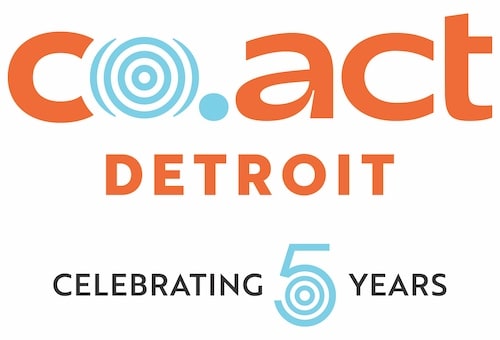In southeast Michigan, Black women are at the helm of four major nonprofit change systems. What does this moment in time mean for you?
AB: I would describe this moment in time as necessary. Both national research and the lived experiences of many local nonprofit leaders of color demonstrate the deleterious impact of structural racism and implicit biases within the sector. The nonprofit sector sits at the center of complex social change, amplifying the importance and necessity of diverse perspectives and voices at the leadership level and beyond. That’s the beauty in talking about our four organizations, but even more broadly, the networks that we’re connected to — we aren’t all approaching everything in the same way. The fact that we’re black women does not make us monolithic. We each have our unique approach of addressing the issues and challenges facing nonprofit leaders and organizations in our community. We each have different experiences, different philosophies, but at the end of the day, we have the same goal: for our communities to thrive and to have equitable access to the resources that we need to realize our full potential.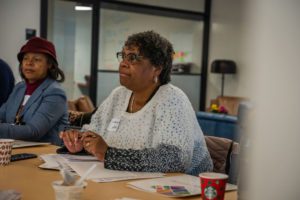
SD: On a deeply personal level, I hold this space with these amazing Black women as sacred. Behind the titles, and true to our unique styles and contributions, is the opportunity to be thought partners, organizational partners, and accountability partners. Knowing that we can commiserate with each other — and that there is a familiarity with sector — grounds me in this work. The uniformity in our rallying cry for justice and change is clear, and the informal network that exists amongst black women leaders in this City is incredible, necessary and powerful. We are celebrating each other, lifting each other up, and most importantly, centering those we serve with every decision made.
What does it mean to share power?
SD: I am honored to serve alongside my team at MCR, where we collectively center our organizational values around equity, trust, service, community-rooted strength, and teamwork. There is humility required to do the work that we do, and our mission requires us to disrupt the status quo. We reframe the notion of sharing power by recognizing the power that exists in the people and communities we serve. Leveling power imbalances comes without hesitation when there is trust. What undergirds this moment in time — particularly with the leaders that are being featured — is the respect for community power, resident power, the resilience of marginalized communities and mutual trust for each other in our leadership roles.
Power, recognition and personal gains will never trump my mission-oriented nature towards this work. My commitment to service and partnership supersedes my attainment of accolades associated with this work.
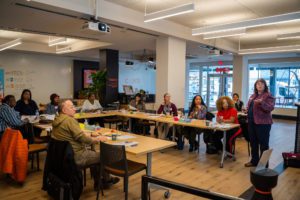 AB: I see sharing power as a strength and a value central to Co.act Detroit’s mission. What can we do together that we can’t do alone? Our work at Co.act Detroit has been and continues to be co-created with nonprofit and philanthropic partners across our region. We approach work through the lens of stewardship — not ownership. I am a steward of this space and its subsequent resources for the nonprofit community. I, Allandra, do not own that. Co.act as an entity does not own that. We are here to steward these resources for the best use and the greatest impact with our community. If we’re always centering those that we’re here to serve, then there’s no place for ego and no need to carry the load alone. Sharing power by definition requires a relational approach, genuine commitment and mutual trust building. It is imperative that we change the way organizations relate to each other. There’s no one power.
AB: I see sharing power as a strength and a value central to Co.act Detroit’s mission. What can we do together that we can’t do alone? Our work at Co.act Detroit has been and continues to be co-created with nonprofit and philanthropic partners across our region. We approach work through the lens of stewardship — not ownership. I am a steward of this space and its subsequent resources for the nonprofit community. I, Allandra, do not own that. Co.act as an entity does not own that. We are here to steward these resources for the best use and the greatest impact with our community. If we’re always centering those that we’re here to serve, then there’s no place for ego and no need to carry the load alone. Sharing power by definition requires a relational approach, genuine commitment and mutual trust building. It is imperative that we change the way organizations relate to each other. There’s no one power.
How do you envision disrupting the status quo in terms of your leadership?
SD: My personal ascent into nonprofit executive leadership necessitated a disruption of the status quo. Donna, Yodit and Allandra personally supported my role and the reimagination of the work of MCR during a very tenuous time in our organization. MCR learned by direct experience that there are many elements that can affect an organization’s health and strength. MCR also learned that our most valuable asset is our network of partners. In a landscape where competition can cloud clarity of purpose, I have come to appreciate that the work of an organization is never accomplished in isolation.
When I look at the arc of my leadership experiences, I reflect upon what happens when you just invest in your team from strictly a professional development standpoint, with a focal point around hard skills. It is incredibly important for me to invest in “my people” so that they can stretch their leadership muscle, their decision-making muscle, and be placed safely in the line of accountability so that they can experience what it means to drive change for the organization. Doing this effectively requires me to reorient myself differently as a leader. It is 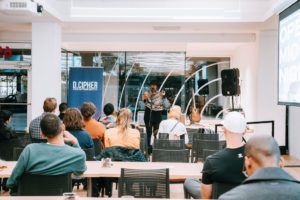 not lost on me that if I am occupying all of the power dynamics, but I am claiming to my team that, “I want you to be a leader, but I’m sitting at all the tables, I’m power broking all the deals, and I am the sole interface with the board” — then that’s just lip service. All that to say, disrupting the leadership status quo is not only about pouring into the hard skills of your staff, but it is, more importantly, how you share space — and share leadership. My leadership style allows me to move out of the way and provide a supportive environment for learning and mistakes.
not lost on me that if I am occupying all of the power dynamics, but I am claiming to my team that, “I want you to be a leader, but I’m sitting at all the tables, I’m power broking all the deals, and I am the sole interface with the board” — then that’s just lip service. All that to say, disrupting the leadership status quo is not only about pouring into the hard skills of your staff, but it is, more importantly, how you share space — and share leadership. My leadership style allows me to move out of the way and provide a supportive environment for learning and mistakes.
AB: Change can feel uncomfortable, but we must possess the courage to challenge the existing paradigms that impede equitable social change and feed inequity in our organizations, sector and communities. Challenging the status quo means reimagining and rethinking what’s possible, collaboratively. The existing model is broken and inadequately addresses our most pressing social problems. Co-creation has the potential to unlock new possibilities in our sector. Intentional preparation and investment into the next generation of leaders of color has to happen.
How do you think about the evolution of your leadership?
SD: There is a level of intentionality that is required in advancing in leadership roles — especially as a woman of color. There is no silver bullet or magic pathway. Many women of color do it differently — whether it takes form through the power of social/fraternal networking; strategically positioning yourself with peers and influencers in the sector; creating your own organization; carving out your own leadership lane; and/or my personal favorite: leaving a trail of fire as you blaze through this work such that you cannot be ignored.
My evolution is ongoing, and my lessons have been birthed in the fire. Any shifts that occur in my life are largely shaped and influenced by my family and their needs — but who I am oriented to be in this world remains constant. I am a servant leader, I am an empath, and my career will ALWAYS tilt towards the service of others. I am privileged to lead MCR, and I approach my work the same, despite the title. My evolution will entail the most authentic version of myself there is. To know me is to know how I lead. My values are the through line.
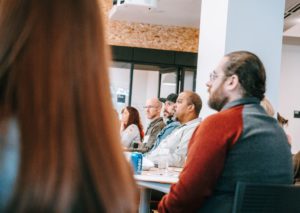 AB: My evolution as a leader has to incorporate the action of continuous learning — never, ever assuming that I know everything, or that my growth and development is done. I learn something new every single day, some new organization that’s addressing an issue, or an old organization that’s new to me — some resource that I can connect nonprofits to that I didn’t know existed. Having a willingness to continue to learn, listen and deepen relationships is really important. I also have a responsibility and a strong desire to share my experiences and what I’m learning with others, especially the next generation of leaders. There are people who have been sounding boards for me. There are people who have corrected me when I need to be corrected. There are people who have poured into me and invested into me. And how dare I not do the same thing?
AB: My evolution as a leader has to incorporate the action of continuous learning — never, ever assuming that I know everything, or that my growth and development is done. I learn something new every single day, some new organization that’s addressing an issue, or an old organization that’s new to me — some resource that I can connect nonprofits to that I didn’t know existed. Having a willingness to continue to learn, listen and deepen relationships is really important. I also have a responsibility and a strong desire to share my experiences and what I’m learning with others, especially the next generation of leaders. There are people who have been sounding boards for me. There are people who have corrected me when I need to be corrected. There are people who have poured into me and invested into me. And how dare I not do the same thing?
